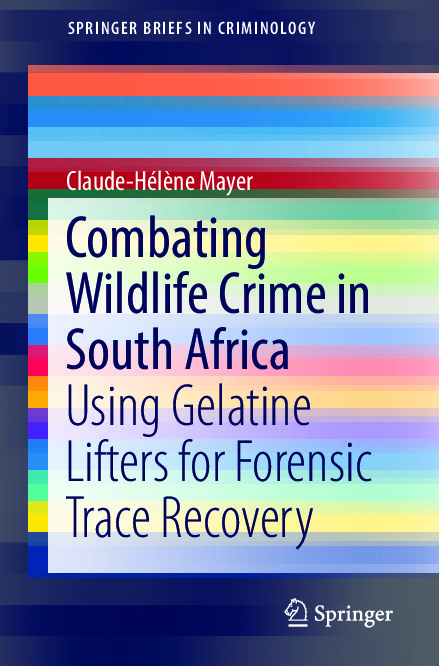File #2544: "2019_Book_CombatingWildlifeCrimeInSouthA.pdf"
Text
1|Dedication|7
1|Acknowledgements|8
1|Introduction|9
1|Contents|10
1|List of Figures|13
1|List of Tables|14
1|About the Author|12
1|Chapter 1: Introduction|15
2|1.1 Chapter Preview|15
2|1.2 General Orientation to the Study|15
2|1.3 Theoretical and Methodological Approaches|17
2|1.4 Problem Statement, Purpose and Aim|18
2|1.5 The Structure of the Study|19
2|1.6 Chapter Summary|19
2|References|20
1|Chapter 2: The Context: Wildlife and Wildlife Crime in South Africa from a Green Criminology Perspective|21
2|2.1 Chapter Preview|21
2|2.2 Green Criminology Perspectives|21
2|2.3 Green Criminology and Wildlife Crime|22
2|2.4 Wildlife and Context-Specific Perspectives in South Africa|23
2|2.5 Wildlife Crime in South Africa|26
2|2.6 Law Enforcement on Wildlife Crime in South Africa|29
2|2.7 Chapter Summary|33
2|References|33
1|Chapter 3: Forensic Trace Recovery in Green Criminology|38
2|3.1 Chapter Preview|38
2|3.2 Introducing Forensic Trace Recovery in Green Criminology|38
2|3.3 Forensic Trace Recovery and Law Enforcement|39
2|3.4 Forensic Trace Recovery and Gelatine Lifting|40
2|3.5 Chapter Summary|42
2|References|42
1|Chapter 4: Research Methodology|44
2|4.1 Chapter Preview|44
2|4.2 Anchoring the Research Methodology|44
2|4.3 Data Collection|45
3|4.3.1 The Setting of Research|45
3|4.3.2 Samples and Sampling|45
4|4.3.2.1 Description of Gelatine Lifters|46
4|4.3.2.2 Sampling Procedure|46
4|4.3.2.3 Description of Indoor Area|47
4|4.3.2.4 Description of Outdoor Area|47
4|4.3.2.5 Shipping of Samples from South Africa to England|47
2|4.4 Data Analysis, Interpretation and Presentation|48
2|4.5 Ethical Considerations and Methodological Limitations|51
2|4.6 Chapter Summary|51
2|References|52
1|Chapter 5: Findings|53
2|5.1 Chapter Preview|53
2|5.2 Conceptual Outline of the Presentation of Findings|53
2|5.3 Presentation of Ten Samples|53
2|5.4 Summary of the Findings with Regard to the Ten Samples|63
2|5.5 Chapter Summary|66
1|Chapter 6: Discussion, Conclusions and Recommendations|67
2|6.1 Chapter Preview|67
2|6.2 Discussing the Findings in Context|67
3|6.2.1 International Cooperation to Combat Wildlife Crime|68
3|6.2.2 Pan-African and Far East Cooperation|68
3|6.2.3 Acknowledging and Addressing South African Specifics and (Post-)apartheid Influences|69
3|6.2.4 Bottom-Up and Top-Down Approaches in South Africa|70
3|6.2.5 Developing Crime Studies and Interdisciplinary Perspectives on Wildlife Crime|71
3|6.2.6 (Training) Professionalism Using Investigative Tools|71
3|6.2.7 Establishing Training Centres in Remote Areas|72
3|6.2.8 Professional Training in Higher Education Institutions (HEI)|72
3|6.2.9 Developing the Use of Investigation Methods in Green Criminology|74
3|6.2.10 Culture-Specifics in Investigation Processes|75
3|6.2.11 Creating Public Awareness on Situation via Media|75
3|6.2.12 Addressing Local Problems Through New Discourses and Actions|76
2|6.3 Recommendations for Future Research and Operational Practice|76
3|6.3.1 Recommendations for Future Research in Green Criminology|77
3|6.3.2 Recommendations for Operational Practice|78
2|6.4 Chapter Summary|78
2|References|78
1|Index|81
1|Acknowledgements|8
1|Introduction|9
1|Contents|10
1|List of Figures|13
1|List of Tables|14
1|About the Author|12
1|Chapter 1: Introduction|15
2|1.1 Chapter Preview|15
2|1.2 General Orientation to the Study|15
2|1.3 Theoretical and Methodological Approaches|17
2|1.4 Problem Statement, Purpose and Aim|18
2|1.5 The Structure of the Study|19
2|1.6 Chapter Summary|19
2|References|20
1|Chapter 2: The Context: Wildlife and Wildlife Crime in South Africa from a Green Criminology Perspective|21
2|2.1 Chapter Preview|21
2|2.2 Green Criminology Perspectives|21
2|2.3 Green Criminology and Wildlife Crime|22
2|2.4 Wildlife and Context-Specific Perspectives in South Africa|23
2|2.5 Wildlife Crime in South Africa|26
2|2.6 Law Enforcement on Wildlife Crime in South Africa|29
2|2.7 Chapter Summary|33
2|References|33
1|Chapter 3: Forensic Trace Recovery in Green Criminology|38
2|3.1 Chapter Preview|38
2|3.2 Introducing Forensic Trace Recovery in Green Criminology|38
2|3.3 Forensic Trace Recovery and Law Enforcement|39
2|3.4 Forensic Trace Recovery and Gelatine Lifting|40
2|3.5 Chapter Summary|42
2|References|42
1|Chapter 4: Research Methodology|44
2|4.1 Chapter Preview|44
2|4.2 Anchoring the Research Methodology|44
2|4.3 Data Collection|45
3|4.3.1 The Setting of Research|45
3|4.3.2 Samples and Sampling|45
4|4.3.2.1 Description of Gelatine Lifters|46
4|4.3.2.2 Sampling Procedure|46
4|4.3.2.3 Description of Indoor Area|47
4|4.3.2.4 Description of Outdoor Area|47
4|4.3.2.5 Shipping of Samples from South Africa to England|47
2|4.4 Data Analysis, Interpretation and Presentation|48
2|4.5 Ethical Considerations and Methodological Limitations|51
2|4.6 Chapter Summary|51
2|References|52
1|Chapter 5: Findings|53
2|5.1 Chapter Preview|53
2|5.2 Conceptual Outline of the Presentation of Findings|53
2|5.3 Presentation of Ten Samples|53
2|5.4 Summary of the Findings with Regard to the Ten Samples|63
2|5.5 Chapter Summary|66
1|Chapter 6: Discussion, Conclusions and Recommendations|67
2|6.1 Chapter Preview|67
2|6.2 Discussing the Findings in Context|67
3|6.2.1 International Cooperation to Combat Wildlife Crime|68
3|6.2.2 Pan-African and Far East Cooperation|68
3|6.2.3 Acknowledging and Addressing South African Specifics and (Post-)apartheid Influences|69
3|6.2.4 Bottom-Up and Top-Down Approaches in South Africa|70
3|6.2.5 Developing Crime Studies and Interdisciplinary Perspectives on Wildlife Crime|71
3|6.2.6 (Training) Professionalism Using Investigative Tools|71
3|6.2.7 Establishing Training Centres in Remote Areas|72
3|6.2.8 Professional Training in Higher Education Institutions (HEI)|72
3|6.2.9 Developing the Use of Investigation Methods in Green Criminology|74
3|6.2.10 Culture-Specifics in Investigation Processes|75
3|6.2.11 Creating Public Awareness on Situation via Media|75
3|6.2.12 Addressing Local Problems Through New Discourses and Actions|76
2|6.3 Recommendations for Future Research and Operational Practice|76
3|6.3.1 Recommendations for Future Research in Green Criminology|77
3|6.3.2 Recommendations for Operational Practice|78
2|6.4 Chapter Summary|78
2|References|78
1|Index|81

